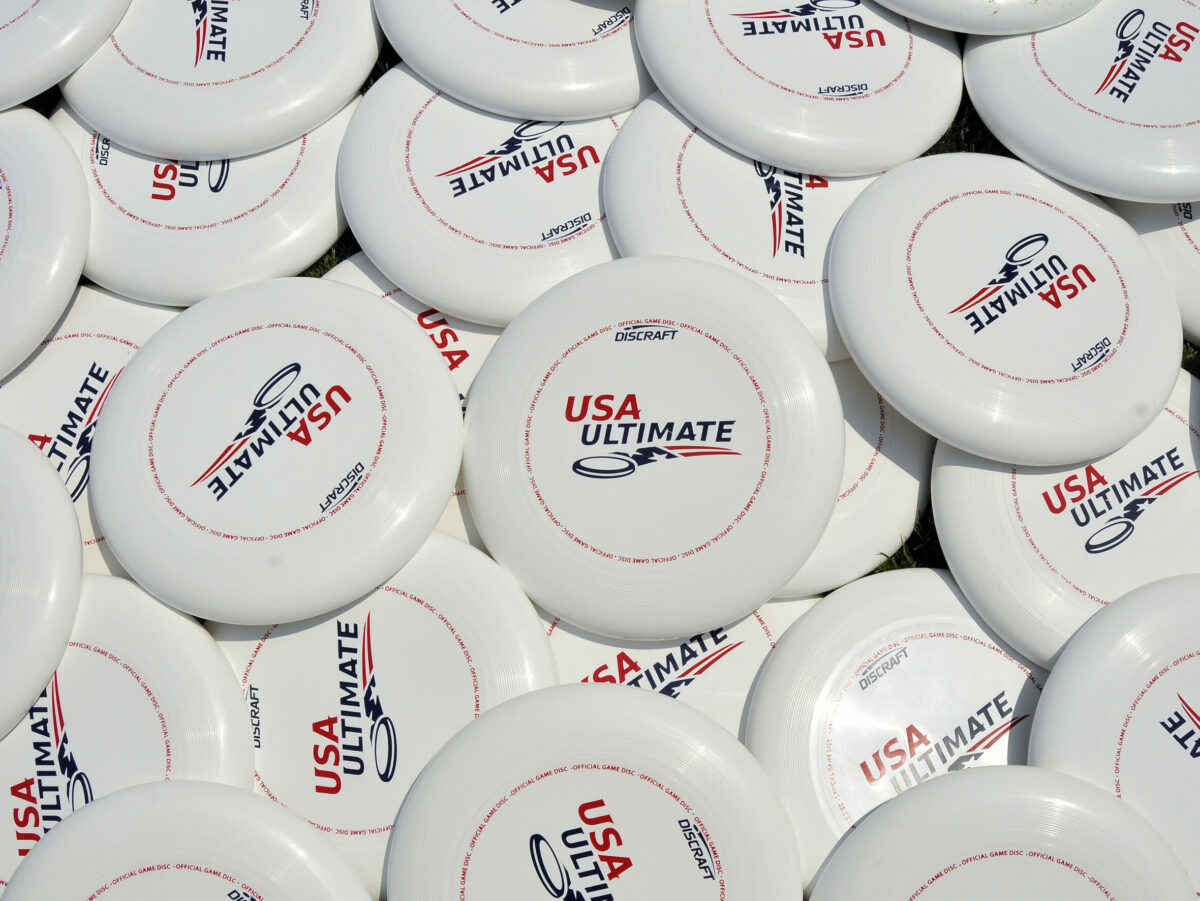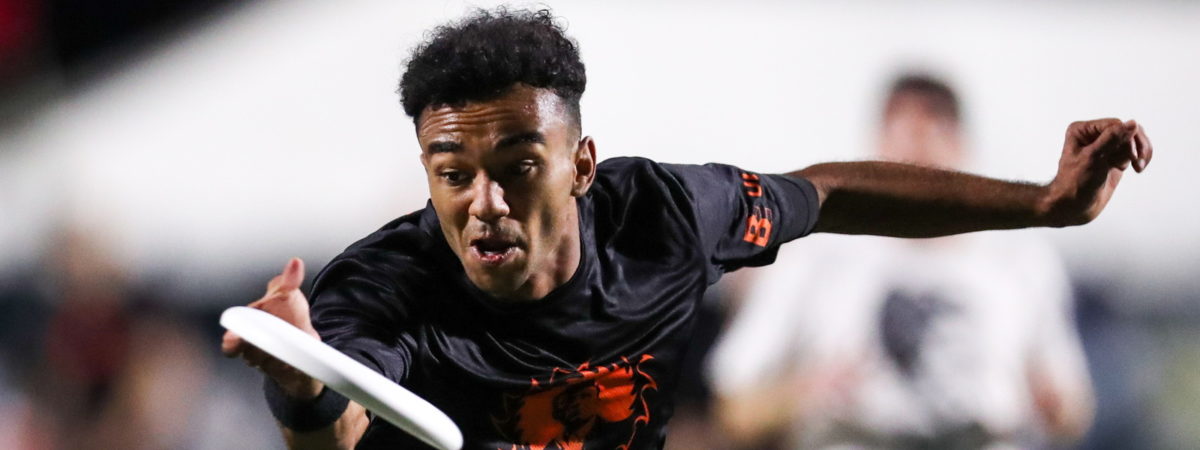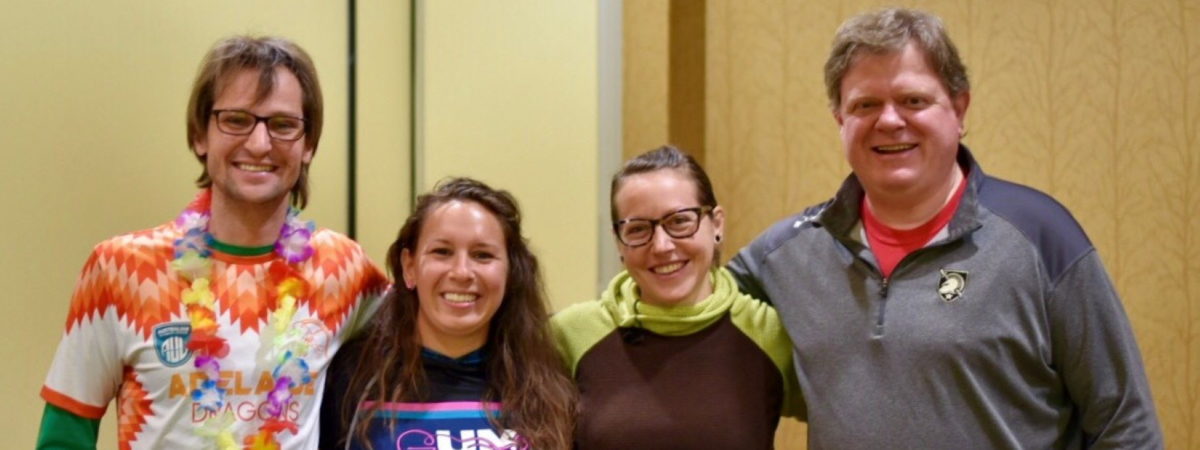Colorado Springs, Colo. (Dec. 15, 2023) – USA Ultimate’s Competition Working Group met in Denver, December. 9-10 for its annual meeting to discuss multiple topics around the sport’s competition structures for all divisions – youth, college, club, masters and beach. The annual meeting included eight USA Ultimate staff members, one member from the board of directors and roughly 30 key volunteers and player-elected representatives from the ultimate community.
The two-day meeting is followed by a summary of each group’s discussion. Following the release of USA Ultimate’s Strategic Plan earlier this year, a special emphasis was put on the four major strategic priorities: elevate youth and grassroots ultimate, enhance local disc organization success, promote excitement for ultimate and fuel the future.
Youth
The Youth Working Group consists of recently hired USA Ultimate Director of Youth Programs Dan Raabe, manager for youth competition Dana Jefferson, regional youth directors Jack Kennedy, Joe Strong, Antonia Van Twisk and Jamie Wolf and guests from Denver-based Altitude Ultimate, Libby Cravens and Justin Salvia, who provided additional perspective, ideas and content to the discussion.
USA Ultimate’s strategic plan, which was influenced by input from the ultimate community’s many stakeholders, is strongly focused on advancing and growing youth and grassroots ultimate, particularly at the local level. The youth working group had lengthy, complex discussions regarding how to best attack the goals outlined in the plan.
As the group discussed how to proceed, it concluded that significant growth would require decisive changes to USA Ultimate’s competition structure over the course of the next several years. It plans to begin with widespread data collection and community discussions with youth leaders across the country. The development of a youth department and addition of Raabe to the newly created, director-level position at headquarters was the first major step of many towards building a more complete, connected and cohesive youth ultimate scene.
The group discussed several aspects of the Youth Club Championships (YCC), including the bid acceptance process, priority structure and equity across divisions. The promotion of girls’ ultimate continues to be a top priority of the group.
The eligibility rules for YCC were further developed to best fit the players that YCC is intended for and took into account situations like dual-enrollment, early graduation, gap years and more in the process.
As part of the eligibility discussion, the group explored exceptions and clarifications, including a new rule that will shift the responsibility for exception requests to the local disc organizations and away from individual players.
Another major point of conversation was the youth volunteer structure. The group discussed a potential restructuring in upcoming years with greater collaboration between youth outreach volunteers and youth competition volunteers in the near term.
College
The College Working Group consists of USA Ultimate Manager for Competition and National Team Programs Matthew Bourland, national developmental college coordinator Amy Hudson, national directors Jeff Kula (men) Beth Nakamura (women), Grace Kiel (D-III women) and Kevin Kula (D-III men).
The group used a thorough analysis of participation data from the last several college seasons to discuss several points of emphasis for the upcoming year.
Rankings were a focal point following the 2023 season and the group addressed multiple concerns, including the ranking algorithm, roster validation and forfeits. The upcoming competition guidelines will reflect a change to the algorithm that removes any benefit for teams that had results invalidated due to issues of athlete eligibility. (Invalidated results will only be included if they lower a team’s ranking.)
The group also reinforced the need for teams to play all of its scheduled games via the addition of a new forfeit deterrent. The rule was inspired by community feedback that forfeited games take away playing opportunities and that teams intentionally avoided opponents they believed could hurt their ranking. By default a 60-point power rating penalty will now be assessed to forfeiting teams, which will be applied to their final regular season ranking. An appeal process will be instituted for legitimate circumstances, including health and safety risks and other verifiable logistical challenges.
The group also decided that an institution’s second/third team, etc. (i.e. developmental teams) at D-III programs will compete in the D-III division during the postseason.
Another key decision was made on the topic of conference “all-advance” events. While these events remain important to properly evaluate and seed teams at regionals, conferences with up to six teams will now use a one-day tournament format. This decision was made to increase the likelihood that events can still be completed in a weekend in the event that inclement weather occurs.
Another major topic of discussion for the group was regional event scaling as it worked to balance the growth of meaningful competition with the growth of the number of teams competing in the college division. A decision was made to specify how many bids would be given to regionals based on team count, gender division and competition division. The scaling determination recognized that D-I and D-III women’s conferences are at a different growth stage, but also aligned with input received to make postseason events more meaningful.
Club
The Club Working Group consists of USA Ultimate Manager for Competition and National Team Programs Marc Zigterman, national directors Carolina Gonzalez-Llanos (women), Genevieve Leo (mixed), and Adam Goff (men), and player-elected representatives Clare Frantz and Eli Motycka (mixed), Kristin Johnson and Tayara Romero Peña (women) and Pawel Janas and AJ Merriman (men).
A primary point of discussion for the working group was the Triple Crown Tour (TCT) and how to best continue providing meaningful playing opportunities to club players of all levels. Per the group’s analysis of the EOY player and team surveys, there was a significant rise in satisfaction from the women’s division, which was a specific point of emphasis from the previous year’s meeting. The group also spoke about how to best continue supporting all divisions while specifically pushing for continued advancements in equity for the women’s division.
While the complete TCT calendar will be announced after the new year, the schedule will look similar to 2023 and again feature an east and west version of the Pro-Elite Challenge and Select Flight Invite, The U.S. Open, Elite-Select Challenge and Pro Championships. Notable elements of the TCT in the soon-to-be-released competition guidelines include:
- The Pro-Elite Challenge will continue to be split into east and west events to reduce travel costs while continuing to provide meaningful playing opportunities for more teams.
- The Select Flight Invite will again be split into east and west and will include both Select Flight teams as well as high-ranking Classic Flight teams.
- The Elite-Select Challenge will continue to be required for Elite Flight teams with an opportunity for Select Flight teams to be invited. The group reiterated the importance of this structure to achieve connectivity in the rankings and earning bids to regionals.
- The U.S. Open will again be required for the top-four ranked Pro Flight teams, with invitations being sent to teams ranked 5-8. Invites will again be extended to international teams. Games against international teams will again count towards overall game totals, but results will again not be factored into rankings.
- The Pro Championships will be limited to eight teams per division with initial invites going to Pro Flight teams.
The group also evaluated several notable ideas that came out of the survey data, including a potential “preseason” that would introduce club tournaments with no impact on rankings, as well as more inclusive high-level events later in the season. Time was also spent discussing the viability of a late-season, second-tier national tournament (similar to the NCAA’s NIT basketball tournament). While no decisions were made, the group acknowledged the challenges with planning such an event but is committed to gathering additional input from the community throughout the year.
Discussions also took place around rosters with regards to injury deadlines, late-season roster extensions and roster mobility.
With the success of local disc organizations being a significant goal of the new strategic plan, the group also explored ways for club teams and local organizations to build or enhance mutually beneficial relationships, connecting the groups through coaching, clinics, events and more.
The “World Cup-style” draw will be used again for the National Championships with minor modifications.
Other topics of discussion included National Championship costs, bid “theft”, registration deadlines, mixed division personnel ratio and majority pull rule, the redrawing of sections to address limitations caused by new competition formats, Classic tournament quality and language around suspended games.
Masters
The Masters Working Group consists of USA Ultimate Manager of Events and Masters Competition Byron Hicks, national directors Kyle Christoph (men), Jolien Munsterhuis (mixed) and Kristi Schmeling (women), at-large masters working group representative Chris Cianfrani, regional coordinator Jeff Berget (south central) and special guest Charles Cooper.
A major focal point for the group was improved communication across the board from USA Ultimate, national directors, regional coordinators and more. The group is working immediately to put together a toolbox of useful communication documents and examples for volunteers, organizers and more.
The group also discussed the 2023 Masters Championships, which hosted 2,500 players on 108 teams across eight divisions. The group elected to scale back the number of teams in 2024 to 100.
At last year’s working group meetings, the masters team worked to form “Super Regionals”, which will continue in 2024 after discussion by the group.
Other topics, including age reclassification and longer national events were also discussed along with additional ideas posed by members of the community.
Beach
The Beach Working Group consists of USA Ultimate Manager of Events David Raflo and regional beach directors Sam Broaddus (east coast), Grant Boyd (west coast), Max Grove (Gulf Coast), Alex Jacoski (Florida) and Hayden Weaver (Great Lakes).
Looking to improve on a successful national event, which was USA Ultimate’s largest ever with eight divisions, 68 teams and 1,000+ athletes, the tournament will include a youth mixed division beginning in 2024. It will be contested as a 4 vs. 4 competition with a 2:2 gender ratio.
The group also intends to build on the successes of 2023 by conducting player, team and organizer surveys in Q1 2024 and create a database of resources for beach event organizers.


